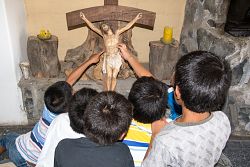'Am I my brother's keeper?' Missionaries put the theme of the jubilee year into practice
Friday, Sep. 30, 2016

Courtesy photo/Henry Lachowski
+ Enlarge
Residents of Hogar Santa Maria boys' home in Lima, Peru, pray at the crucifix.
By Henry and Jeanne Lachowski
Special to the Intermountain Catholic
In the bustling city of Lima, Peru, with a population of over 9 million, the poor, the handicapped, and the ill soon melt into the margins of society. However, the Maryknoll Missioners answer “yes” to the question Cain asked of God: “Am I my brother’s keeper?” (Gn. 4:9) Their brothers and sisters are the marginalized; their presence not only touches lives but also transforms them.
Eduardo, a 14-year-old from the northern desert area of Peru, was drawing on concrete to earn small change for two months as he searched Lima for his father, who had gone to the city looking for work and lost contact with his son. After police found Eduardo and realized he was homeless, they contacted Michael, then director of a boy’s home called “Hogar Santa Maria” in southern Lima.
At Santa Maria, Eduardo has gained more than 60 brothers and a nurturing staff of adults to serve as surrogate parents. The tutors and several staff members are alumni of this family-oriented shelter. Most boys come from families living in poverty, families in crisis. At the home they get three nutritious meals a day, uniforms and school supplies, and caring friends. Most importantly, they come to realize their self-worth, and find love in many forms.
Father Peter Byrne, a now-retired Maryknoll priest, has been supporting this boys’ home for more than 30 years. Fr. Pete, who served in Peru for 50 years and has devoted his life to defending children’s rights, travels every year from California to celebrate baptisms, confirmations, and the anniversary of Santa Maria’s founding, which occurs in January. His advice to us was that rather than worrying about how our poor Spanish skills would hinder our interaction with the boys, we should “just hug them.” Hugs are always welcomed and always returned.
Where would the boys be if not accepted at Santa Maria? They would have minimal food, questionable friends and less or no schooling. They might not have the work ethic that the daily chores at the home provides. They wouldn’t have a kitten to cuddle, nor watch chicks and ducklings grow. They wouldn’t have Canela, the horse, to pet. Soccer teams are easy to form among so many here, and as “brothers” they learn that disagreeing with others gets you nowhere. That couldn’t happen as easily outside the walls of the home.
If any boy is troubled or has a problem, Michael, Eric, or Juan – former residents and now mentors – or the director, Marcela, are there to comfort and guide them. Seeing a tutor put his arm around a boy is very common, as are their mutual smiles.
Not far from the boy’s home is “Casa Bartimeos,” a massage school for the blind run by Maryknoll Father Kyungsu Son. We had never considered getting a massage from a blind person. It felt great.
Can you imagine life without sight? Fr. Kyungsu says he can identify. As he was trying to finish seminary, he had to learn English, a language very different from Korean. He felt handicapped.
Later, in Peru, when a professional massage teacher who happened to be blind asked Fr. Kyungsu for support, the priest felt his true calling. Most blind people are never offered a job. However, massage services are perfect for the blind, who are extra sensitive to touch. After 30 years as a parish priest in distant parts of Peru, Fr. Kyungsu found a former Maryknoll parish, Niño Jesus, willing to offer classroom space for massage classes for blind men and women. Now, 20 students in each class attend full-day instruction each Saturday for a year. Part of their internship is to offer free massages to prisoners, a great experience for both sides. One of the prisoners, Ana, cried as she thanked the group for remembering the prisoners and offering such a wonderful service. Meanwhile, Gustavo felt pride as never before when his name was called as a preferred masseuse – the word was spreading about his professional skills.
Bishop Carlos Garcia of the Diocese of Lurin, and Fr. Guillermo Cornejo, the pastor of the Niño Jesus parish, are very supportive of Fr. Kyungsu’s ministry. A new training center and lunches for the blind are just a part of their support.
Maryknoll presence in Lima’s prisons and hospitals is extended to HIV/AIDS patients as Father Joe Fedora visits and listens to their stories. He offers the sacrament of healing. Tears crawled down Maria’s cheeks as Fr. Joe listened and offered her hope. Watching Fr. Joe give individual attention to each patient, never rushing, is a blessing in itself, as seen in the faces of the patients. His presence reassures the HIV patients that they are not forgotten. Fr. Joe takes his calling seriously as he continues his visits even while serving as Maryknoll Latin America regional superior.
Am I my brother’s keeper? Who is my brother? It is the street boy who seeks friends, shelter and care. It is the blind person who needs a job. It is the hospital patient dying of AIDS. They, and all those in need, are my “brothers.” It was a great pleasure to participate with Maryknollers and others in serving them.
Henry and Jeanne Lachowski spent three months in Lima, Peru early this year as short-term Maryknoll volunteers.
For questions, comments or to report inaccuracies on the website, please CLICK HERE.
© Copyright 2024 The Diocese of Salt Lake City. All rights reserved.
© Copyright 2024 The Diocese of Salt Lake City. All rights reserved.

Stay Connected With Us